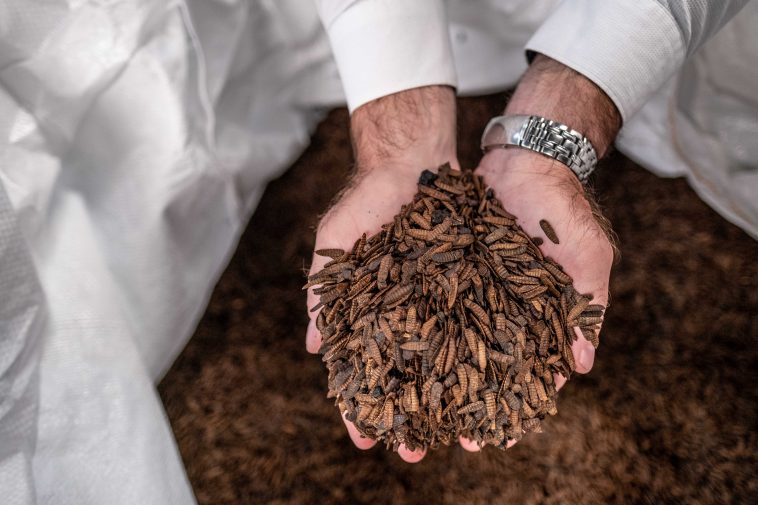By Dean Smorenburg, CEO at Maltento
Small changes can create significant differences in the most surprising of ways. In an infinitely chaotic world, filled with seemingly infinite variables, implementing large and lasting changes to our environment does not necessarily require large changes or inputs, with the tiniest of creatures carrying significant potential for change.
This “butterfly effect” approach is all around us — just think back to the pandemic and the domino effect on culture, technology, and society caused by uncontrolled microscopic agents. If the flap of a butterfly’s wings can, hypothetically, cause a typhoon, then what impact can flies have?
Black soldier flies, in particular, demonstrate this phenomenon quite well. By using their larvae, one fly farm currently based in Cape Town can convert up to 600,000 kgs of agri-processing waste per month – including spent grain from the beer industry – into a high-performance, nutrient-dense protein for pet and aquaculture feed.
Spent brewers grain can sum up to 3% of the total global food wastage, this adds up to about 40 million metric tons per year. But by implementing such a small and low-impact change (using such small creatures), a positive and demonstrable impact is created to benefit the planet and our pets.
Beyond being a source of protein and oils, the larvae of these flies also produce something called “frass,” a by-product with substantial nutritional value. This nutrient-rich by-product can be used as a soil amendment that enhances soil fertility, promotes nutrient cycling, and improves soil structure wherever used. This is where another small change (enabled by a small organism) can yield great benefits.
The Benefits of Foresight and Adoption in Cape Town
Frass is a highly adaptable substance that can (and should) be considered for a wide range of cases. The City of Cape Town, for example, currently uses fertilisers and soil amendment products that can cost between R12,000 and R24,000 per metric ton (approximately); this average could be cut down significantly if the city made a small change to their planning and budget and switched over to a sustainable and natural product like frass, which only costs R4,000 per ton with a 50% moisture equivalent.
Beyond cost as a motivator, frass also has an incredible ability to better control unpleasant odours associated with decomposing organic matter. This makes the black soldier fly frass great for use in the city itself, lending itself to public space use (such as in the gardens and landscaped segments throughout the city).
As a high-density population centre and tourist destination, the City of Cape Town should understand the importance of appealing public spaces – minimising foul odours via less olfactor-intense fertiliser at a fraction of the cost of the alternative is, thus, clearly beneficial. Then there are the benefits to water conservation: frass contributes to organic matter in the soil, improving its structure and water retention, making it ideal for a region and a city with a history of water shortages.
But the resulting benefits create further ripples for local growers and communities: frass contains beneficial microorganisms that contribute to soil health and plant growth. These microorganisms may include bacteria and fungi that aid in nutrient cycling and help enhance soil structure. This useful waste product also has a pH that is very close to neutral, a significant element needed for the cultivation of a range of staple vegetables, such as cabbages, onions, lettuce, and cauliflower. In this regard, frass can be used in communities and local vegetable gardens to regenerate soil that has been consistently used over several decades without rotation.
This would allow those who grow their own food in townships and informal settlements to have cost-effective and high-quality soil regeneration products. One particular fly farm has already begun to distribute and provide frass to underserved communities in Cape Town’s Lavender Hill, improving the sustainability and agency of people who live in low-income communities around the Cape.
Beyond the clear ecological benefits of using a natural waste byproduct, frass can be used to create closed-loop systems. This is specifically true for fields where barley grains are cultivated: after the harvest, barley is used to create beer, with the remnants of the plant becoming ‘spent grain’.
This spent brewer’s grain is digested and causes larvae to excrete fresh frass, which can then be used back onto the future barley and hops fields. This process creates a sustainable cycle that regenerates the soil at the farm and contributes to healthy crop growth for the next harvest.
This closed-loop system is completely free of heavy metals and pesticides that would otherwise appear in low-cost fertilisers. Once again, such a small change provides an environmentally friendly option from which the City of Cape Town can benefit.
Leading Responsibly by Example
There is currently a tremendous opportunity for cost savings in the agricultural and environmental sectors when it comes to soil amendment products. Not only are standard soil amendment products like nitrogen fertilisers more costly, but their production process creates higher levels of greenhouse gas emissions.
If the city wants a more sustainable and cost-effective approach, it will need to incorporate products that are better for both the planet and the taxpayers’ pockets. If the city looked at replacing just 1% of its current usage with frass, it would be a great step forward to embracing alternative fertiliser approaches. A 1% replacement would also allow the city to test the product responsibly and begin to foster sustainable partnerships with local fly farms.
Ultimately, promoting the creation of a circular economy (with a system that promotes the use of products, materials, and resources for as long as possible) aligns with many of the goals we hold to be important – and when local and municipal governments topple the first domino in the chain of small changes, large effects and benefits will be felt across the medium-to-long term.
By emulating global cities – such as those located in the Netherlands, France, Spain and Luxembourg – with green and sustainable practices, the City of Cape Town can position itself as a champion of a sustainable, circular economy that encourages closed-loop systems and environmentally sustainable practices, leaving a positive impact on both the environment and the way the rest of the country looks to the city as a leader in innovation and ethical governance.



